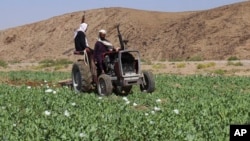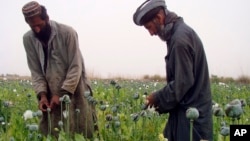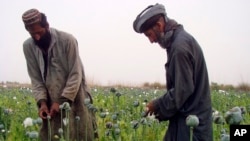De facto Taliban authorities in Afghanistan are presenting an impressive list of achievements in the fight against narcotics about a year after their reclusive supreme leader, Hibatullah Akhundzada, outlawed drug production.
To implement Akhundzada's edict, Taliban forces have conducted 5,799 counter-narcotics operations, apprehended 6,781 drug traffickers, seized 1,799 tons of drugs, and dismantled of 585 heroin production labs, according to Taliban officials.
The regime's claims are substantiated by independent observers.
"As they also accomplished during 2000-2001, when they were previously in power, the Taliban have effectively banned opium poppy cultivation, resulting in an enormous drop in the opium cultivated area in 2023," said William Byrd, a senior researcher at the United States Institute of Peace (USIP), in written answers to VOA.
Satellite imagery used by a British organization confirms significant across Afghanistan this year.
In Helmand province in southern Afghanistan, where more than half of the country's illicit drugs were produced, cultivation reportedly has dropped from 129,000 hectares in 2022 to only 740 hectares in 2023.
For nearly two decades after the Taliban were ousted from power, poppy cultivation and opiate production soared in Afghanistan, making the landlocked country the world's largest heroin producer, according to the United Nations.
Concerned that the illicit drug economy was fueling the Taliban insurgency and organized crime and corruption in the Afghan government bodies, the United States was among several donors that poured in several billion dollars to tackle the problem.
It did not work.
At the height of the problem — when poppy cultivation reached upwards of 330,000 hectares in 2017-2018 — the U.S. Special Inspector General for Afghanistan Reconstruction (SIGAR) reported, "No counterdrug program undertaken by the United States, its coalition partners, or the Afghan government resulted in lasting reductions in poppy cultivation or opium production."
Untenable situation
"The world wanted Afghanistan to do this [counter-narcotics] and here we have done it," Taliban spokesperson Suhail Shaheen told VOA from his office in Doha, Qatar. "We are doing it until we completely eradicate it."
The Taliban are notorious for brutally enforcing their agendas, from banning schools for girls to banning farmers from cultivating the lucrative opium poppy crops.
The school ban has earned the Islamist regime universal condemnation, and experts say the opium poppy ban could result in serious domestic problems.
"By enforcing a drug ban and pressing crop destruction deep into some of the most remote areas, while offering no alternatives, the Taliban leadership risks provoking rural unrest, as well as growing dissent within its own ranks, particularly Taliban members from these areas who must answer to their families, neighbors, and rural constituencies," wrote David Mansfield, a British observer and author on narcotics in Afghanistan, in a recent analysis for Alcis.
Dire consequences
Isolated, under international sanctions, and facing myriad security, governance and economic challenges, the Taliban are unlikely to permanently wean Afghanistan off its longstanding dependence on the drug economy.
"The opium ban is imposing around a $1 billion per year economic shock [to the Afghan economy]," said Byrd of the USIP.
Strict enforcement of the opium poppy ban will yield dire consequences for the already weak Afghan economy, forcing people to migrate abroad in search of jobs and income, Byrd said.
"We have appealed for international assistance," said Shaheen, the Taliban spokesperson whose designation to Afghanistan's seat at the United Nations has failed, while the former Afghan government appointee remains accredited.
Such calls remain unanswered as donor countries condemn the Taliban's so-called gender-apartheid regime in Afghanistan, where human rights groups say women are being erased from all public spheres.
As donors weigh the dilemma of whether to aid the Taliban in its drug war or continue pressing them to improve governance, "some may well decide that a continued flow of drugs from Afghanistan may be the least worst outcome," according to Mansfield.
While 95% of the drugs produced in Afghanistan end up in Europe's black markets — nearly all of the illicit drugs consumed in the United States come through Mexico — the U.S. has been the largest donor for counter-narcotics programs in Afghanistan, with $9 billion in appropriations until December 2021.
Over the last two years, the State Department's Bureau of International Narcotics and Law Enforcement Affairs has continued funding counter-narcotics messaging, monitoring of the production, and alternative livelihood projects through the United Nations and other international organizations.












